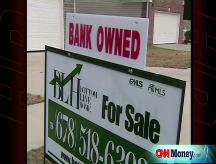Senate poised to pass housing bill
Foreclosure rescue bill takes big step forward. But all of measure's provisions aren't settled since the House wants to have another crack at it.
NEW YORK (CNNMoney.com) -- The saga still isn't over, but after months of debate on Capitol Hill, the Senate seemed poised Thursday to finally pass a comprehensive housing and foreclosure prevention bill this week.
The measure, which would create a new government-backed foreclosure prevention program and strengthen oversight of Fannie Mae and Freddie Mac, still faces a likely final debate in the House.
The House passed a version of the bill in May and is expected to try to amend some Senate provisions to bring them closer in line with its bill. Any changes will need to be considered by the Senate.
That likely back-and-forth makes it uncertain when lawmakers will be able to send final legislation to President Bush for his consideration. Final passage of a package has been delayed for close to two months due to substantive disagreements as well as countless procedural delays.
On the Senate floor Thursday, one of the lead authors of the bill, Senate Banking Committee Chairman Christopher Dodd, D-Conn., lamented how long it has taken to move the bill through. "Candidly, we can't wait any longer."
Dodd cited the latest foreclosure data, released Thursday, showing 250,000 new foreclosure filings in June, up 53% from a year earlier.
"A lot of us hoped the market would take care of all of this and there would be light at the end of the tunnel," Dodd said. "[But now] the only light at the end of the tunnel is a train coming."
The omnibus housing package attempts to address the housing crisis in several ways. Among them is providing more relief for some borrowers facing foreclosure; increasing access to mortgages in higher-cost areas; modernizing the loan guidelines for the Federal Housing Administration (FHA); and more stringently regulating Fannie and Freddie, the government-sponsored enterprises that have taken a beating this week amidst concern over how well funded they are.
FHA role expansion. Under the Senate bill, the FHA could insure up to $300 billion in new 30-year fixed rate mortgages for at-risk borrowers if their lenders agree to write down their loan balances to 90% of the current appraised value of their homes.
Lenders would also agree to pay upfront fees to the FHA equal to 3% of a home's appraised value. Borrowers must agree to pay an annual premium to the FHA equal to 1.5% of their new loan balance and they must also agree to share with the government any profit they realize from selling or refinancing their home.
The cost of the new FHA program - which will only be in place for a few years - would be funded by fees from Fannie and Freddie. Thereafter those fees would finance an affordable housing trust fund also created by the bill. The House version of the bill calls for those fees to be used solely for affordable housing.
Create a new regulator for Fannie and Freddie. The GSEs, which grease the wheels of the housing market by guaranteeing the purchase and trade of mortgages, will get a new regulator under the bill. That regulator, among other things, will have a greater say over how well funded the agencies are - a major concern in the markets that has sent stocks in both companies plunging.
"We know they play a central role in our housing. We also know that together they owe over $5 trillion in debt, and they're thinly capitalized. The way to keep them [from getting into worse shape] is to create a strong regulator to make sure they're adequately capitalized," Sen. Richard Shelby, R-Ala., another key architect of the bill, said Thursday on the Senate floor.
While the Senate bill calls for the appointment of a new regulator to be made immediately, House Democrats want the appointment to be made 6 months from the date of enactment.
Raise conforming loan limits. The bill would permanently increase the cap on the size of mortgages guaranteed by Fannie and Freddie to $625,000 from $417,000. The FHA maximum loan limits for high-cost areas would also increase to $625,000. The House bill raises the limit at all three agencies to nearly $730,000.
Higher loan limits will make it easier for borrowers to get mortgages, because they're more likely to be traded if they are considered conforming.
Update FHA rules. The bill would update a number of rules for FHA loans. Among them, it would increase to 3.5% from 3% the down payment requirement for borrowers in FHA loans. And it would eliminate a program that has allowed sellers to provide down payment assistance.
The House bill had contained a modified form of the down payment assistance program.
The seller-funded program is largely the reason why the agency's reserve has fallen by $4.6 billion, according to congressional testimony of FHA Commissioner Brian Montgomery. Currently, that reserve is roughly $16.4 billion.
Provide housing-related tax credits. The Senate bill includes more than $14 billion in tax credits. One is an $8,000 tax refund for first-time home buyers. The refund, however, serves more as an interest-free loan, since it would have to be paid back over 15 years by the buyer.
Help states buy foreclosed properties. Despite a White House veto threat, the Senate bill still contains a provision that would provide states with $4 billion to buy and fix up foreclosed properties.
The House is expected to debate whether or not the provision should stay and also whether it should be paid for by raising an equal amount of revenue elsewhere. If not, it could be considered emergency spending, in which case lawmakers would not have to compensate for the cost of the provision. ![]()







